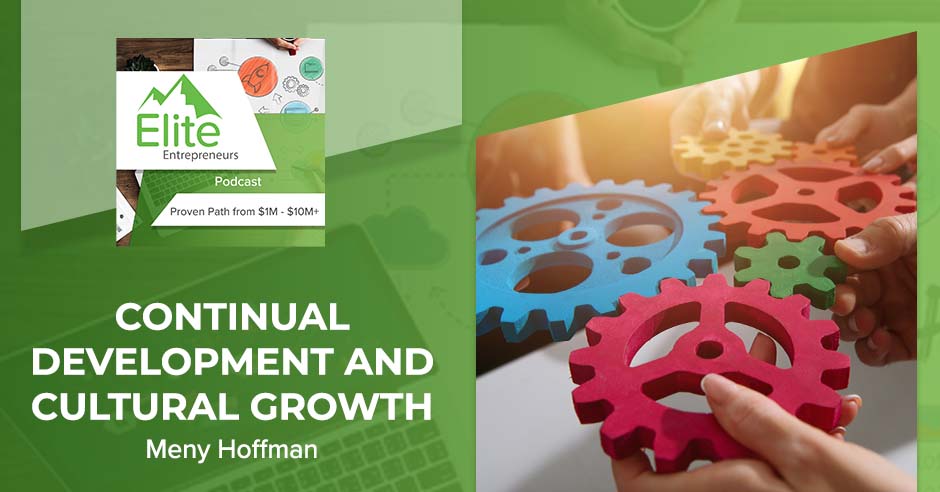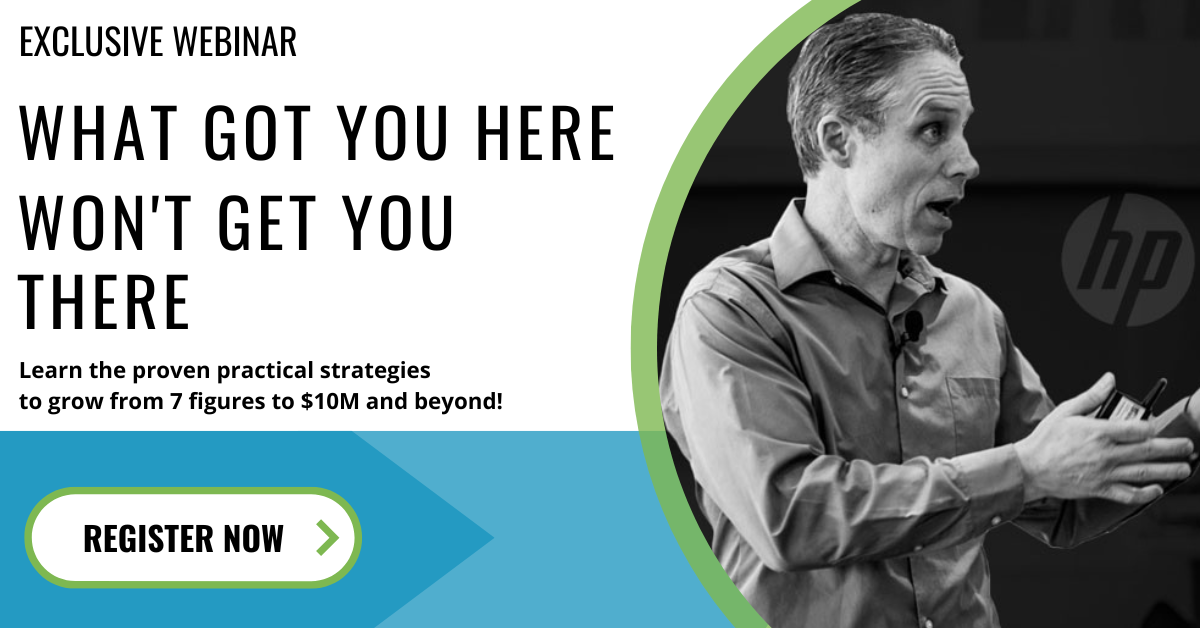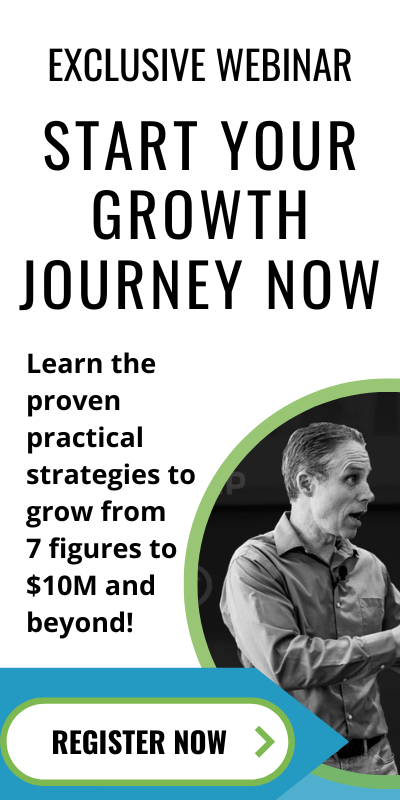Episode 8: Continual Development And Cultural Growth, With Meny Hoffman
Meny Hoffman is the CEO of Ptex Group, an award-winning branding, marketing and business services agency headquartered in Brooklyn, NY. As a lifelong entrepreneur passionate about creating winning strategies that help growing businesses flourish, Meny has been successfully helping private label product brands grow and thrive since 2001, some of which have reached over 8 figures in sales. He is the founder of the Let’s Talk Business (LTB) platform, a movement to provide entrepreneurs with powerful tools needed to learn, grow and lead. Meny is a popular speaker who shares his strategies at regional corporations and conferences. He is a proud husband and lucky father of seven. To learn more, visit www.menyhoffman.com.
What the podcast will teach you:
- Why it is important to transition from an entrepreneur to a business leader to further the growth of your business
- Why Meny found it particularly challenging to relinquish control of aspects of his business through delegating work to others
- Why even growing businesses need to be prepared to scale their strategies with their growth or risk failure
- What activities and practices Meny follows that allow him and his team to continue to grow with their business
- How Meny coaches and helps develop leaders within his organization, and how he structures his weekly activities
- Why Meny considers himself to be the Chief Culture Officer at Ptex Group, and why culture is such a key focus of his work
- How Meny defines a great culture, and how he brings the members of his team into alignment on their core values
- What practical benefits a company can expect from dedicating time and energy to culture work
Resources:
- Website: www.ptexgroup.com
- Website: www.ptexgroup.com/podcast
- LinkedIn: www.linkedin.com/in/menyhoffman/
—
Continual Development And Cultural Growth, With Meny Hoffman
Welcome everyone to this episode. I am happy to be able to introduce you to our guest. His name is Meny Hoffman. He is the Founder and CEO of Ptex Group. Meny and I have known each other for a long time. He is an outstanding entrepreneur who has been through everything that I hope you, as readers, can relate to. He can share with you some very practical insights into how to get over some of those seven-figure growth challenges. He built the business up to over seven figures.
He will talk about his business, where it is located, what he does, and all that stuff. I want you to be reading the practical things that Meny did to break through some of his challenges as an owner of a seven-figure business that was facing some difficulties. Meny, welcome to the show. Please tell us a little bit about yourself and your business. I am excited to ask you some questions about your experience.
Thank you so much for inviting me. I am the CEO of a branding agency called Ptex Group. We are located in Brooklyn, New York. We have been around for many years with a team of over 30 people in-house. What we do is we help growing businesses flourish, which means if you have a proof of concept looking to get to the next level, we will help you through strategy and execution of those different branding and marketing initiatives you need to take in order to get to your company to the next level.
Tell us what your take is on the phrase overnight success.
Overnight success is years in the making.
There are some strange exceptions, but most of the entrepreneurs I know and love are good at working hard at it, day in and day out.
I know that you teach this every day with the content you put out there and your events. The word growth is being thrown around so many times in the world of business. Growth is the blessing and the curse of the pentagon. If you are able to manage it, it is a blessing for your company, but sometimes if you are not prepared, ultimately, that could put you out of business as well.
Overnight success is years in the making. Share on XWe did not talk about this before we hopped on here. On our show, in the very first episode, I interviewed Clate, who you know. We talked about the stages of small business growth. We talked about how, at each new stage, there is a whole new set of challenges, a whole new set of dynamics, where you have got to have the right combination of people, processes, and systems to be able to get to that next place. Growth can be a blessing and a curse. It is a blessing when we know what the challenges are that we are going to face and we know how to overcome them.
We would love to learn about your specific growth and through those stages. I do not want to go all the way back to the beginning. You have over 30 team members. We did not talk about your revenue or where you are at. You do not have to share that if that is not comfortable. Let’s rewind to the place where you were about at $1 million, maybe a little more. Maybe you had 10 or 12 people. I do not know how many people you had at that point, but let’s talk about some of the challenges that you faced as you crossed over into that seven-figure mark.
Speaking about growth, the way I approach it and then the way I say it is what I went through. It is going to have a double effect. Growth, on its own, is very easy. If you are building a company, you are going to experience growth and you are able to grow your company. Speak to any entrepreneur 6 months in, 12 months, usually, that entrepreneur had a full-time job and then finally they had this idea of what they want to do. Maybe it was a side gig at first and then they quit their job in order to be able to do this full time. Speak to that same entrepreneur, he or she, six months in and you ask them, “How is it going?”
They say, “The best decision I ever made.” Eight months in, “Best decision I ever made.” All of a sudden, as time goes on, you are not seeing that same level of excitement. Usually, that is a symptom of every business owner which they are in the phase of managing growth. That is when they start saying, “I cannot do it by myself. I need to bring in people. I hired this first person, but they are not as excited as I am. They are not as good of a salesperson as I am. They are not as good at marketing as I am.” You are never transforming from an entrepreneur, building a company by yourself, and now becoming that leader and building a foundation of managing the growth, which usually translates into the word scalability.
You are not building the infrastructure in a way. Going back to asking me the question, it is very hard for me to go back to exactly remember which stage this was. Every company keeps on facing those challenges every few years as they hit new marks. They have to prepare themselves for the next phase or the next growth stage in their business cycle. It comes to a point where you have to start taking everything out of your own mind and start distributing and delegating to different people.
Was it $1 million? Was it $1.5 million? Was it less than $1 million? The first time I faced this was when I started saying, “How could I take what I know, my knowledge or my way of doing things, and start putting it into different people that are going to start taking different responsibilities within my company?”
At first, it is just you. You are building a company, but it is all based on your abilities and your knowledge and expertise. You start to add people and you are taking a piece of your creation and trying to break it off or carve it out of your own mind and hand it off to somebody else and give ownership. What was that like for you the first few times that you were trying to relinquish some control and give it to another human being?

Cultural Growth: As time goes on as an entrepreneur, your level of excitement will drop. That’s a symptom of being in the phase of managing growth. As you grow, you can’t do everything by yourself.
It was very hard in our business, even more than any other business, because we are in a creative space where creativity is a vision that somebody has. I had a double play. I had a vision for our own company, but then I also had a vision of when I spoke to a lead, I spoke to a prospect, I spoke to a client, “What are we going to do with your next project?” At one point, saying that there is another creative director working on the graphics or on branding or there is another person doing sales. They are having different types of conversations that I would have had or had with different clients.
Long-term clients are also starting to say, “We have a project manager. We have an operations manager.” All of those things come with great pain, but that is how a business is being built. I always tell business owners that growth pain needs to be a given in every single business. This is not a reason to quit. It is a reason to overcome it and move on.
In fact, you know this just from our conversations in the Elite Forum years ago that most businesses never make it to that million-dollar mark because they hit some of those growth hurdles, some of those growth stage changes and they just quit. The pain is too great. They cannot keep going.
It is even more than that. We have statistics. I am not sure about the recent statistic out there that 80% of businesses fail within five years or 90% or 60%, whatever the statistics are. If we look at those statistics, those businesses, in total, have billions of dollars of sales. They are not making sales or not having any revenue. They are companies with actual clients needing their services and they are still going under. That is proving the point that being prepared for managing the growth or even having a scalable model, if you are not forward-thinking and looking at that lens, even if you have a lot of business coming your way, at one point, you will fail.
Let’s get practical with this. You learned early on that you were going to have to take this knowledge or some things out of your brain and hand it off to somebody else. You would have to do that in a repeatable fashion if you were going to hire more of the same types of people. What did you do? Where did you turn? How did you learn to do that? What are some of the practical things you did that enabled you to manage growth?
I love learning and I love learning in the stages where I am. If you look back, I have had different mentors and attended different programs, where I was and what type of information I wanted to learn. I knew at one point that I need to follow a process and get to the next level. At one point, I attended the Elite Forum, one of my first programs, where I attended a three-day event. I got a framework. I went away from reading books on different topics of different pieces of the puzzle. I rallied around a certain framework that I have seen working. It was the Infusionsoft infrastructure that I admired very much.
I have been with Infusionsoft since 2007. I have seen them from the early years and how they grew with leaps and bounds as far as revenue, people, and culture. I love seeing a framework that I could follow or mimic or lean on to understand how it is being done and try to mimic it into our small business then. That was one of the programs that I attended that was eye-opening. I still reference back to a point. Maybe you were in the room at that time. It was close to the end of the third day. Somebody went around the room and asked everybody for their a-ha moments. Do you remember that?
If you’re not focusing on the business as a leader, then nobody else will. Share on XYes. We call it final thoughts. We are having final thoughts.
I remember when they came to me and asked me for my final thoughts. I said, “I came all the way from New York thinking that all my people are the problem. I am leaving, knowing that I am the only problem.” I do not remember who it was, but somebody says, “Meny, do not be so harsh on yourself.” I went on to explain that if you are a leader of a company, it is your obligation to make sure that you are working on the business in a way that there is a certain vision.
There is a certain understanding your employees know what their responsibilities are and how we are going to move to the next level. If you have great people, but you are not giving them the proper leadership, then it is my fault. If you do not have the right people, then it is still your fault why they are with your company. Swap them out with other people.
I love that part of the experience. We do not need to go into talking about the Elite Forum more, but I love the wrap-up experience where we do final thoughts and ask business owners what is present for them after sharing the framework you discussed. Sometimes they are very memorable. I do not know that I could have spotted that one off from memory that you just said, but having you remind me of that moment was fun to remember.
You were one of those relatively few who quickly grabbed onto the idea that the problem is the person looking in the mirror. You have to be a different person. I love, from the outset, how you said, “I love growth. I love to grow. I love to learn.” That is the type of seven-figure business owner that is going to figure out what it takes to keep growing and not just personally, but for their business.
There is a popular quote from Dave Ramsey, which says, “A company will never outgrow their leader.”
I believe that wholeheartedly. You knew, “I have to become the leader my company needs me to become.” We both know Clate Mask, so I will reference him periodically in our conversation, but that is one of my favorite things from him over the years. He would always tell our new employees, “I am not the CEO our company needs me to be twelve months from now, but by the time we get there, you can count on the fact that I will be.” It is that constant drive to grow and be the leader that the company needs at a later stage.

Cultural Growth: If you have great people, but you’re not giving them the proper leadership, then it’s your fault. And if you don’t have the right people, swap them out with other people.
Some people will say, “It is very humble to say it, but how does it apply practicality and practical terms? What does it mean? How does it change your day-to-day operation or the day-to-day work?” I would say that it is very tangible. It is very practical because there is responsibility. Speak about vision. Speak about working on the business. If you have a team of people, most of those people are working and grinding every single day, hustling to deliver the service and what you need to deliver. If you, as the leader, are not focusing on the business, “Where do we want to be in 6 or 12 months from now? What products do we need to change or swap out?” nobody else will.
This is tangible work you need to do. Talk to our readers about some of the things you still do to work on your own growth? Assuming you are not the leader that your company will need you to be in the future, how are you trying to stay ahead of that? How are you trying to grow yourself? What are some books you are reading or things you do to keep moving forward?
I love reading books. I am so obsessed with reading books that we have a program in our own company called the Book of Initiative that I pay $50 for every book you read.
You are developing the team through this as well. You are not just doing it yourself. You are bringing them with you.
The reason why books are so valuable is because you are able to read a book that you can apply five minutes after you finish the book. You can read books. If you have somebody that is becoming a leader, you could give them some great books to read immediately to put into action because they are going to be communicating and leading a team.
If it is a graphic designer that needs to enhance their skills, there are great books in that space where they could understand how great marketing campaigns have been done in the past versus going to a program way before you are ready. I love that concept. Second of all, podcasting, which I am obsessed with. We host our own podcast called Let’s Talk Business. I always tell my guests that one of the benefits of hosting a podcast is that I can listen to those guests and learn from them first because I am interviewing them.
Podcasting is a way of growing yourself.
Books are valuable because you're able to apply what you've learned five minutes after you finished the book. Share on XPodcasting is a little different. My approach with podcasting is that you always have to swap around different podcasts. I love podcasts of people teaching. I love podcasts of people interviewing because most of those interviews are business owners that are grinding it, hustling day in, day out. You could learn from other leaders a certain tip. I always say you have to think out of the box. It is not every piece of the conversation that is going to apply to you. If you listen to a 30, 40, or 50-minute episode and learn 3 or 4 things you could implement, you are worth your hour.
Constantly listen to different types of CEOs of different types of companies, different types of leaders, how they overcame different challenges on, how they are approaching their challenges in the business currently and how they are working with their team and how they are building the culture and steal ideas. Steal ideas and implement that in your company.
Let’s go back to books for a second. I do not want to list a ton of titles, but I do want to ask when you are developing leaders in particular because, as you know, one of the biggest tricks, as you are growing a seven-figure business, is how to develop leaders fast enough to manage the growth. Your company’s growth is limited by leadership, not just the leader but all the leaders combined. What are you having them read to develop leaders? Our readers need to do this as well.
I do not have a particular curriculum or a type of a set of books that I give them. I have my top ten books that people ask me all the time like, “What are the top ten books?” I always say, “Depending where you are in your journey.” There are certain books that you would want to give them to read as they are developing. I feel personally, depending on the size of your company, so I cannot speak for larger organizations.
Let’s say in a company at our stage where the CEO is the leader. We have 20, 30 employees and you are developing leaders. The best thing you can do is have enough one-on-one time with them and walk them through what happened today that you might have wanted to do differently or need a little bit of help on how to handle a situation. I call it inspecting what you are expecting.
How much time are you dedicating to coaching your leaders as they are developing?
I have a structure for my ideal workweek. In a bird is-eye view, Mondays are dedicated to internal conversations. Tuesdays are more external and then Wednesdays, I do the podcast and other special projects, deep work, as I call it. Thursdays are half client-related work and half team. Each week, it will depend. There are conversations that I do with my leaders every single week, at least once a week. We sit down together. We also have group meetings once a week. I would, periodically, in the rest of that internal time, call in different people to keep my finger on the pulse of the happiness and the culture because culture is something you would never outsource to anybody other than the leader.

Cultural Growth: When listening to podcasts, not every piece of the conversation is going to apply to you. But if you listen to an hour episode and learn something that you could implement, then it was worth your hour.
You believe strongly in the idea that you are the company’s chief culture officer.
When we speak about culture with other leaders, I will ask them, “How much are you spending? Are you working on your culture?” They will say, “I am so passionate about the culture in my company.” I say, “Let me open up your calendar. Let me see how much time is there for culture.” Culture does not happen by accident. We could go into that conversation, but culture needs a lot of work.
We might want to go down that path as well. Before we do, though, is there a cadence by which you are trying to get through books? Your leaders, you have this book initiative that you do and recognize when they read a book. Is this one a month, one a quarter? What is a cadence you personally are trying to keep and then what are you trying to lead your people through?
Me, personally, I always have more books ready to read. With the speed that I can read, I always am in the middle of reading at least one book. I usually try to read every two weeks a book. It would also depend on the title. I will give you an example. We have implemented the EOS system in our company, which is taking us to a deeper level of clarity. For that project, there were a bunch of books that we wanted to read. I went faster in reading them. There are recommendations of different groups that I am involved.
Somebody will say, “This is a great new title.” There are always books lined up. For our team, there is no mandatory requirement to read books. The book initiative is a 100% volunteer program, which means that if you read a book, it could be from our library, could be your own title that you just heard about, or you just found out about, or somebody gave you a book to read. If you read a book and we ask you for 4 or 5 questions. One is the top three things you learned from that book. Do you recommend other people to read the book? What star level would you give it?
Those emails go out every Monday. Whatever submissions of books come in, throughout the week, every Monday, sometimes it is one, sometimes two, and the reason for those emails that go out to the whole company is that some people are not great at reading. Sometimes even seeing the recap of this person read The Five Dysfunctions of A Team and they pointed out those three highlights, that becomes the water cooler conversation. Sometimes somebody else will just say, “Could I borrow this book? It sounds like an interesting book for me to read as well.” We do not mandate it because we believe that it needs to come from people’s willingness to want to read and want to grow themselves.
You have this organic organizational knowledge happening, though. If somebody reads a book, they like it, and you are not just saying, “Read a book. Check.” You are actually sharing a few key things from that book. Some of those things make their way back into the company, into the team.
A great culture is a culture of excellence. That means there is an alignment of core values across the organization. Share on XWe had books that 5 or 6 people read right after the other based on the recommendation.
Let’s circle back to being intentional with culture. Perhaps we could use the word nurturing that needs to happen to develop your culture in the way that you want it to go. What are some of the things that you have done to nurture and develop a great culture that some of our readers might be able to learn from?
The first thing I usually say and that people are reading this show or paying attention to the content you are putting out, there is confusion in the world of business of what culture is a good culture is in the first place. People sometimes confuse a ping pong table and a babysitting service as a great culture, and maybe some of those enterprises in the future. We know we have cereal and people think, “They have a great culture. They have all kinds of cereal in the cereal bar.” Those are perks. There is a place and a time for those.
In my opinion, a great culture means that there is a culture of excellence. We have certain things that keep us together and there are common practices on how we operate in our organization. If we could align ourselves in those core values, it could be at 6, 7, 8, 9. We can have that same alignment and the same understanding of, “This is how we operate.” There is common ground between people because, in every organization, you are going to have all kinds of people, introverts, extroverts, more organized, less organized. The world is full of all kinds of different people. If you want to build a certain culture, you have to find common ground and we call that core values and what brings them together.
First of all, as a leader, you have to develop them. You have to ask yourself the question of what is important to you and what is important enough that even if other people will operate on your brand because it is your company, it is your creation. It is enough importance that you have to make sure that they are operating on the same census. That is the first step. Once you develop it, it starts a whole new process. When people come in from the interviewing process to living it on a daily basis, how do you nurture that culture that people see it is important to you and they have to live by it on a daily basis as they are producing work, working environment, working with coworkers?
The way you talk about this, Meny, I am trying to put myself in the reader’s shoes there. They are seeing you say, “You got to do this work around developing values.” They have got a business to run and goals and people to manage. You are saying, “You have got to work on values.” It sounds a little like it could be soft stuff or fluffy or, “Kumbaya, we have values.” What does it do in your business? How does it translate into something beneficial to your company that I would want to stop everything else and do some of this work?
I have questioned this process myself. I will give you a very practical example first. This is a true story. At one point, when my father wanted to do business with Ptex, he used to call me and say, “Meny, could you do me this business card? Could you do me this flyer?” I knew that I had to take that call and I had to serve as my father because it is my father. If I want to be able to say to my father that, “Jill will call you back and service you and take care of you exactly the same way that I did or even better or maybe even faster because I am busy with a ton of different things.”
That is only if you are able to develop the core values in a way that you know your people are dedicated enough to the cause and to the way you do business, the same way you would have done the business. To put it into more day-to-day work, for instance, one of our core values is we are partners, not service providers. I know maybe other people have that same core value.

Cultural Growth: When you’re developing leaders, the best thing you can do is to have a one-on-one with them and walk them through what you might’ve done differently. Inspect what you’re expecting.
What it means by us is that if we are suggesting a marketing campaign for a client or we are doing a marketing campaign for a client, we would ask ourselves if you would be the owner of that brand, what do you also tell the customer? What do you also tell yourself that, “I am going to spend $20,000 to develop it.”? Those are partners, not service providers. Think about yourself as a partner in this project.
Are you satisfied with what you are seeing in front of you? While we are looking at the big picture, we have to sweat all the details, which means when we do creative work, we have to look at the details. Those are things that come up in conversations day to day between coworkers. One of our core values is true courage. Why we have a value called true courage is because we want to be able to not have any bureaucracy, being able to be open and transparent, and having those hard conversations that in other organizations you would go around and you would feel something, but you would be afraid to say something.
That is something that we use in light of true courage. I want to tell you that at that meeting, that comment was not appropriate because I am the salesperson. I should have been asked if we could also do this because of that price. Every day, it translates into a much healthier environment. When you have a healthier environment, people are happier. I always say, “Happy team makes happy clients, which equals a happy bank.”
You are telling me and telling all of our readers that doing this values work, helping people get really clear on how we do things around here, why we do them this way, all of that provides a lot of clarity so that you can take coordinated action to achieve goals more quickly.
One hundred percent because it is the how. We have the why, which is the passion and the vision and the mission. We have what we want to do, which are more strategic goals, but they also have to be a how. If you are not focusing on the how, you are bringing in all kinds of people and everybody is running their own and running to the same destination, but from a different direction. At one point, as a leader, you lose your own comfortability working and growing this.
It sounds like you remove a lot of potential chaos and confusion when you help everybody get clear, when you establish a culture very intentionally, and then you do all the work to keep it alive and well as you bring in new people.
We have developed a beautiful booklet, which is only for potential employees. If somebody is coming for an interview process, we will show them a book of our core values. Sometimes in an interviewing process, you could see a person and how they react to such a book. Some people will say, “I love this. Finally, I am seeing a company that is paying attention.”
A happy team makes happy clients, which equals a happy bank. Share on XThey shine that this is the dream job. While other people could smirk and you could see it on their eye contact like, “This is a nice booklet.” You can right away see the people that want to look for potential growth in their own growth and then the company growth. We are in the business of helping growing businesses flourish. If we are not actively working on growing ourselves, how can we help companies grow?
I remember when you showed me your booklet with the values. I do not know if you have made new iterations or new versions, but I remember being so impressed with how well you captured the essence of each one. I can imagine what that moment is like when you are introducing it to a prospective team member. You guys are doing it right. Every time I talk to people and they are talking about better ways to hire, I help them see that this is just like marketing.
Only you are not marketing to prospective clients. You are marketing to prospective team members. I can see that moment where the right team member opens this booklet up and sees your values come to life because you guys are so gifted with images and creativity. That would be a magical moment for the right person. For the wrong person, it would be like, “Whatever.” You can see it.
I am reminding myself of when I gave you the booklet at one of our events that I met you. Sometimes we also do events and teach this and explain it to other companies and other leaders how important it is. Some people will see this and say, “Meny, could we just use all your core values? We love it. It is so nicely laid out.” I say, “If you are only using it for your website because you want to have a nice page, there is a time and purpose for it, but it is not what we are talking about now. We are talking about core values that you could ingrain in your culture and day-to-day conversations.”
This is so natural for you because for years at Infusionsoft, we talked about it this way. Culture is the internal version of your external brand. Culture and brand are two sides of the same coin. You help people develop and establish their brand. It is very natural for you to see clearly how that brand needs to be expressed internally with their values.
For your readers, I know you mentioned it a couple of times, practical advice. Some people are sometimes very lost, “How could I start doing this?” If you are a company and you have maybe a few employees, the best way is to lock yourself in the room, have everybody write down 5 or 6 things that come to mind, what sets us apart, how we operate, and have everybody working separately on a list and then see the common theme. Sometimes you could complement that with 2 or 3 clients and ask them, “If you need to come up with one or two lines of what sets us apart and why you love working with us?” Culture is what is already there, but you just have to articulate it in a way that you can then build on it.
To draw it out for people, you are saying that the real work here is one of describing what is already. You are not creating new values. You are articulating ones that are already.

Cultural Growth: Get intentional about your focus so that you can develop a level of clarity. Once you have clarity as a leader, you need to then cast that clarity to your team.
Most of the time. Sometimes it would be where we want to go. We know we are terrible at this, so let’s say communication or lack of. The leader would say, “We are going to put this front and center as a core value because we want to make sure that we will get better at it as well.”
Meny, you have shared so many great ideas and practical ways to do some of this stuff. If we were to try to wrap a bow on this conversation, as you have been developing yourself over the years and working to develop your team and being very intentional with your culture. What has been the biggest challenge in all of that process? What is the most difficult about trying to do this work?
Staying focused and having the level of clarity you need to have as a leader. Above that is casting that clarity to your team. To explain, especially we live in a world where there are so many shiny objects coming your way, so many opportunities knocking. Every second, a LinkedIn message is, “I think we could do business together if we do this or we will do that.” If you lead a company to get intentional about your focus and then that focus should help you develop a level of clarity.
Being able to cast that to your team because the worst thing you could do is gain clarity but not share it with your team. What happens then is people start seeing different decisions and movements. They do not know why this is happening. First and foremost, you have to have the proper focus and have your own clarity and then make sure that you are casting that clarity to your team so they could say, “I am with you on the ride,” or, “I am not with you on the ride.” Based on that, you could see, “Who are the people that are with me on the ride that I could count on?”
I hear you saying that when you do this right, you are not only getting clear, but this is a constant thing that you must be doing and talking about as a leader going forward. In other words, this is not a one-and-done activity. You are beating that drum consistently for all the right team members. They are attracted to it. They stay if they are the right team members, but you do not ever get out of the business of setting vision. It is ongoing.
If you look at companies as successful as Apple, they have their growth challenges. They are facing it in larger numbers and maybe a couple of extra zeros that we might not have, but they are having it on their stage. You never outgrow the challenge of scalability and growth.
Meny, this has been a fantastic conversation. I appreciate you taking the time to be with us on the show. You mentioned your podcast. I want to make sure that people can learn more about you, your company, and your podcast. How can people tune into what you are doing? If they want to search your company out or learn more about you, where would you send them?
Our company is PtexGroup.com and then if you want to listen to our podcast, it is called Let’s Talk Business. If you go to PtexGroup.com/podcast, you will be able to see all the previous episodes and also the links to your favorite podcast app in order to be able to subscribe. Me, personally, we do have weekly emails that we send out. I am very active on LinkedIn. It is Meny Hoffman. Search and connect to me on LinkedIn. I will tell your readers that I do have a great guide to help leaders with delegation. If you are going to personally private message me on LinkedIn saying that, “I read this episode. I love what you shared. Could you share with me the delegation guide?” I will be happy to send it to you as well.
It sounds like you want people to reach out, which is great. I might have to do that myself. I am looking forward to seeing the delegation guide.
The reason for that is we live in a world where people just try to download. We never build relationships. Even if we have online tools like LinkedIn, if we spent an hour speaking about this, you could see my passion for the cause. I would love to help other people as well. When we have that one-on-one interaction, there is an opportunity to be able to share what they are going through and learn from those people as well.
I really appreciate it, Meny. Thanks again for being our show. I encourage all the readers to take some of the very practical tips you shared and apply them to their business. You are doing great work and I appreciate you taking the time.
Thank you so much.
That is the end of our episode. For all you readers, we are excited to have you come and join us every week for new guests and material where we focus on bringing you practical insights into some of the seven-figure growth challenges we all face growing our businesses. Thanks for reading. See you next time.
Important Links
- Ptex Group
- Clate – Past episode
- Let’s Talk Business
- The Five Dysfunctions of A Team
- Meny Hoffman – LinkedIn
Want to listen to more? View all episodes here >



